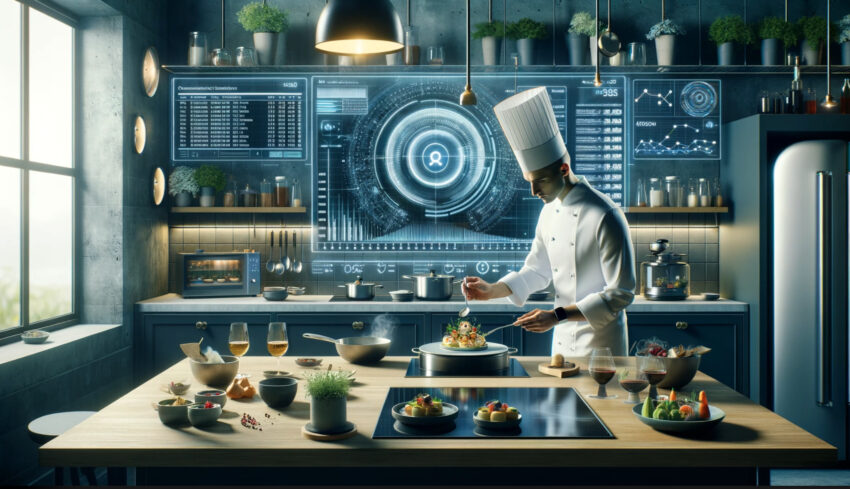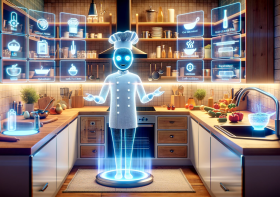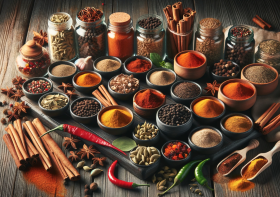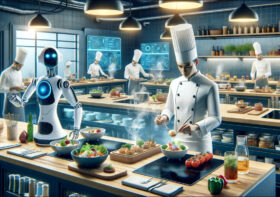Can AI Generate Michelin Star Quality Recipes?

The culinary world is buzzing with a fascinating question: Can AI generate Michelin Star quality recipes? This intriguing idea bridges the gap between technology and gourmet cooking, sparking debates among chefs and tech enthusiasts alike.
As an expert in this field, let’s delve into this topic, exploring the capabilities of AI in the high-stakes world of Michelin-starred cuisine.
The Evolution of AI in Cooking
A Brief History
Artificial Intelligence (AI) in cooking isn’t a brand-new concept. For years, technology has been making its way into our kitchens, from smart appliances to recipe recommendation apps. However, the leap from assisting to creating is significant. AI systems are now being designed to not just follow recipes but to invent them.
Understanding AI’s Role
The role of Artificial Intelligence (AI) in the culinary world is a fusion of technology and tradition, where algorithms meet artistry. To grasp AI’s potential impact on Michelin Star-quality cooking, we must delve into how it works and what it brings to the table.
AI as a Culinary Assistant
- Recipe Optimization: AI can analyze a vast array of recipes, breaking them down into core components like flavor profiles, ingredient pairings, and cooking techniques. This allows it to optimize existing recipes or suggest modifications that could enhance a dish.
- Trend Analysis: AI tools are adept at analyzing current culinary trends, which can be crucial for chefs looking to stay relevant and innovative. By understanding what’s popular or emerging in the culinary world, chefs can adapt and infuse these trends into their cooking.
AI as a Creative Partner
- Innovative Combinations: AI’s lack of inherent bias allows it to experiment with ingredient combinations that might seem unconventional to a human chef. This can lead to the creation of unique and innovative dishes.
- Cross-Cultural Culinary Fusion: By accessing a global database of recipes and cooking styles, AI can suggest fusion dishes that bring together diverse culinary traditions, potentially leading to groundbreaking new cuisines.
AI in Personalization
- Customized Cooking Experiences: AI can tailor recipes to suit individual dietary needs or preferences. This personalization is especially relevant in the era of increasing dietary restrictions and lifestyle choices.
- Responding to Feedback: AI systems can quickly adapt recipes based on user feedback. This feature is invaluable in a professional kitchen setting, where customer satisfaction is paramount.
AI and Efficiency
- Speed and Precision: AI can process information and generate recipes much faster than a human, providing chefs with immediate inspiration or solutions to culinary challenges.
- Consistency in Cooking: AI-powered tools and appliances can ensure a high level of consistency in cooking, which is crucial in a Michelin-starred restaurant. Consistent quality is often as important as the creativity of the dishes.
Challenges and Limitations
- Lack of Intuition and Sensory Perception: AI lacks the human chef’s intuition and sensory perception, especially regarding taste, smell, and aesthetic appeal. These senses play a crucial role in fine dining and are hard to replicate with technology.
- Cultural Nuances: While AI can analyze data, understanding the deep cultural and historical nuances of certain cuisines can be challenging. These nuances often play a significant role in Michelin Star-level cooking.
Understanding AI’s role in cooking, particularly at the Michelin Star level, is about recognizing its potential as a tool for enhancement rather than a standalone solution. It’s a partnership where AI brings efficiency, innovation, and personalization, while human chefs bring intuition, sensory knowledge, and cultural understanding. This synergy could be the key to unlocking new culinary heights, where technology and tradition coalesce to create extraordinary dining experiences.
AI in the kitchen represents a new frontier in culinary arts. Its role extends beyond mere recipe generation, offering chefs a dynamic tool for innovation, efficiency, and personalization. As AI continues to evolve, its integration into the world of high-end cuisine will likely become more seamless, opening doors to previously unimaginable culinary creations.
AI’s Approach to Recipe Creation
The Data-Driven Kitchen
At its core, AI’s recipe creation is data-driven. It analyzes existing culinary data, flavor pairings, and cooking techniques to create something unique. But is this enough to reach the revered Michelin Star quality?
Creativity vs. Algorithms
In the quest to achieve Michelin Star quality in cooking, we encounter a fascinating intersection: the raw, intuitive creativity of chefs versus the precise, data-driven approach of AI algorithms. This juxtaposition raises a crucial question: can the algorithmic precision of AI truly match or enhance the creative flair required for top-tier culinary excellence?
The Essence of Culinary Creativity
- Intuition and Experience: A significant aspect of a chef’s creativity comes from intuition, often honed over years of experience. It’s about sensing which flavors will marry well or how to adjust a dish intuitively based on look, smell, and taste.
- Artistic Expression: Culinary creativity is akin to art. Chefs, much like painters or sculptors, express themselves through their dishes. This expression is deeply personal and often tied to a chef’s background, experiences, and culinary journey.
- Emotional Connection: Great dishes often tell a story or evoke emotions. This emotional resonance is something chefs aspire to achieve, creating an experience that goes beyond mere taste.
The Algorithmic Approach of AI
- Data-Driven Decisions: AI relies on data and patterns. It can analyze thousands of recipes and ingredient combinations to suggest new creations. However, these suggestions are based on patterns and probabilities, not intuition or emotion.
- Consistency and Precision: Where AI excels is in delivering consistent results and precise measurements, crucial in certain aspects of cooking, especially baking and patisserie.
- Limitless Exploration: AI algorithms can explore combinations that might never occur to a human chef. It doesn’t get tired or run out of ideas, continuously generating options based on its vast database.
The Creative Limitations of AI
- Lack of Sensory Judgment: AI lacks the ability to taste or smell, fundamental senses in cooking. It cannot judge the subtleties of flavor balance or the nuances that make a dish go from good to extraordinary.
- Missing the Human Touch: The human element in cooking encompasses more than just creating a dish; it’s about the story, the presentation, and the connection to the diner. AI, in its current form, cannot replicate this human touch.
Finding a Middle Ground
- Collaborative Creativity: The future might lie in a collaborative approach, where AI provides a foundation of ideas and chefs inject their creativity to refine these into something truly special.
- Enhancing Chef’s Capabilities: AI can handle the mundane or repetitive tasks, freeing chefs to focus on the creative aspects of cooking. It can also be a source of inspiration, suggesting ideas that chefs can develop further.
The debate of creativity versus algorithms in achieving Michelin Star quality recipes is not about choosing one over the other but finding a harmonious balance. AI brings efficiency, innovation, and a new perspective, while human chefs bring artistry, intuition, and emotional depth. Together, they can create a culinary experience that is both technologically advanced and deeply human.
In conclusion, the magic in Michelin Star cooking lies in the blend of science and art, technology and tradition. As AI continues to evolve, its role in the culinary arts will likely grow, but it will enhance rather than replace the indispensable creative spirit of the chef. The future of high-end cuisine may well be a symphony of algorithms and artistry, data and dexterity, all coming together to create extraordinary culinary experiences.
The Human Element in Michelin Star Cooking
The Chef’s Touch
Michelin Star cooking is as much an art as it is a science. The chef’s experience, instincts, and personal touch play a crucial role in creating a dish that’s worthy of a star. This includes understanding the subtleties of flavour, texture, and presentation – aspects that are inherently human.
Emotional Connection
Cooking at this level is also about telling a story and connecting with diners on an emotional level. It’s about the passion and story behind each dish. Can AI replicate such a deeply human aspect of cooking?
AI and Culinary Creativity
Exploring New Culinary Territories
AI excels at exploring combinations that a human chef might not consider. It’s not confined by traditional culinary boundaries, which can lead to innovative and surprising dishes.
Personalization at Scale
AI can tailor recipes to individual tastes and dietary requirements more efficiently than a human chef. This level of personalization could be a game-changer in creating bespoke dining experiences.
The Limitations of AI in Gourmet Cooking
Understanding Local and Seasonal
Michelin Star cooking often involves a deep understanding of local and seasonal ingredients. AI might struggle with this aspect, as it requires a level of cultural and environmental awareness that goes beyond data.
The Art of Presentation
The visual presentation of a dish is key in Michelin Star cuisine. AI might be able to suggest ingredients and methods, but the artistry of plating is a human skill that is difficult to replicate digitally.
Collaborative Cooking: AI and Chefs Working Together
Complementing Skills
Instead of viewing AI as a replacement for human chefs, it could be more beneficial to see it as a tool that complements their skills. AI can handle data analysis and suggest new ideas, while chefs can bring their creativity and experience to refine these suggestions.
Enhancing Creativity
AI can push chefs out of their comfort zones, suggesting ingredients or combinations they wouldn’t have considered. This can lead to a collaborative process where technology and human creativity work hand in hand.
The Future of AI in High-End Cuisine
Continuous Learning and Improvement
AI systems learn and improve over time. As they are exposed to more data and feedback, their suggestions could become increasingly sophisticated and potentially closer to Michelin Star quality.
A New Era of Personalized Cuisine
AI could usher in a new era of personalized cuisine, where dishes are tailored to individual preferences at an unprecedented scale. This could redefine the concept of luxury dining.
Conclusion
So, can AI generate Michelin Star quality recipes? The answer is nuanced. While AI can certainly innovate and personalize in ways that are groundbreaking, the Michelin Star’s essence lies in the human touch – something that AI cannot fully replicate. However, the collaboration between AI and human chefs could pave the way for a new culinary era, where technology enhances creativity, leading to extraordinary culinary creations.
In the end, the fusion of AI and human expertise in cooking is not just about reaching for Michelin Stars but about pushing the boundaries of what’s possible in the culinary world. As we continue to explore this synergy, we might just find ourselves at the dawn of a new age in gourmet cooking.


